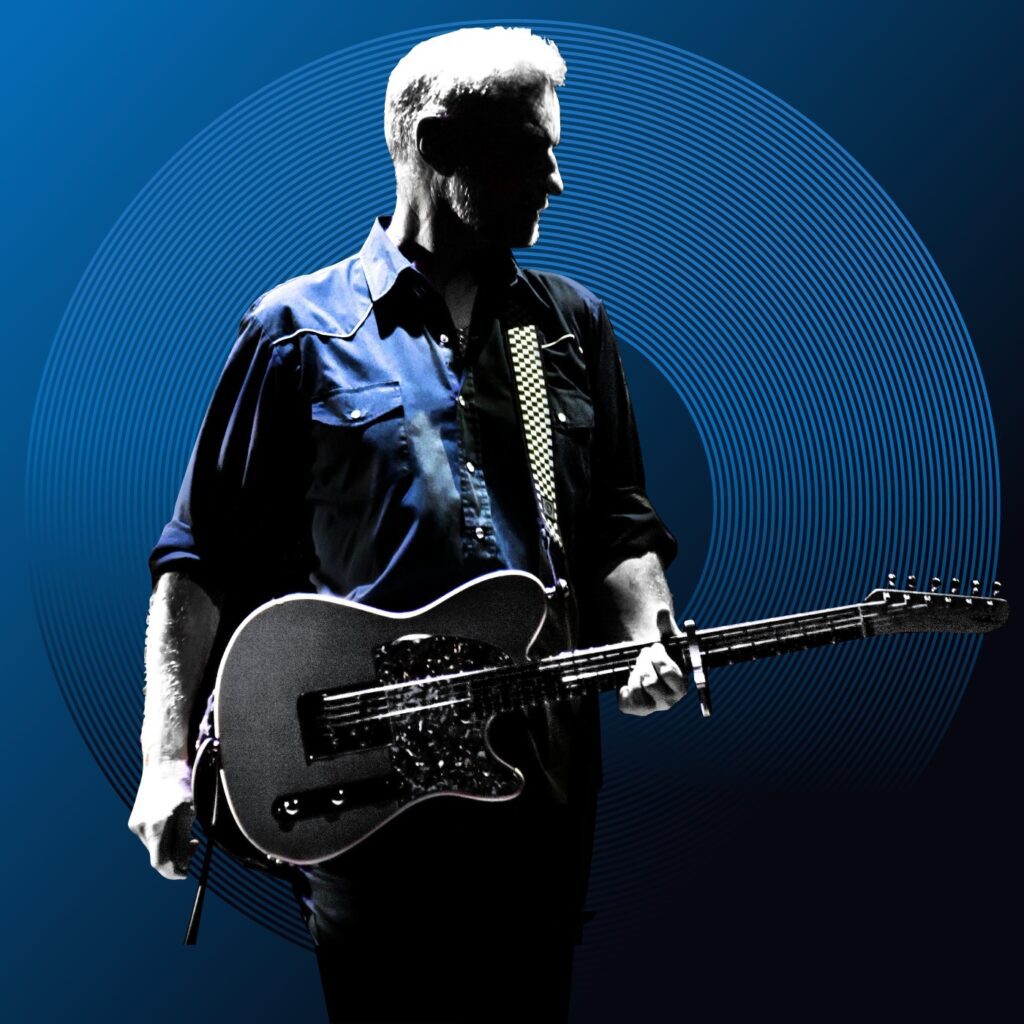Billy Bragg wrapped up his five week North American tour Sunday in familiar surroundings —the 9:30 Club in Washington, where he was quick to joke he was starting at 9.
He had just played a more intimate show Saturday at the Atlantis next door the night before, but a big crowd still was on hand to hear a career’s worth of ringing songs as cutting as his slashing solo electric guitar chords. He had a few things to say about the political situation as well, of course, especially about the imminent election. But he also had some hard-learned lessons from his 40th anniversary tour of the States, some of which he stated, and others of which he demonstrated.
Looking sharp in neatly cut grey hair and beard, and a shirt-like jacket, the purchase of which he went into great detail, Bragg took care to tune between every song as he continued his banter. Because every performance these days is duly shot by fans on smartphone video and shared online, he explained, musicians dare not turn out a sloppy performance, lest it live forever in some corner of the internet.
This may be unexpected in a rocker who rose up in punk, raising his voice and single guitar since the start, but it made for a nicely honed performance which swelled beyond its setlist to last nearly three hours. The extended set was filled with favorites from early in his career—with “Greetings to the New Brunette,” a big singalong to “New England,” and the poignant sting of “Levi Stubbs’ Tears” in a year that claimed the last of the Four Tops.
But he had some strong songs from his latest collection, the 2022 The Million Things That Never Happened, as well—from “Freedom Doesn’t Come for Free,” about a collapsed Libertarian experiment in New Hampshire, to “Mid Century Modern,” about retaining one’s beliefs even as one grows old; and “The Buck Doesn’t Stop Here No More” about the lack of accountability in the highest office. “If history teaches us one thing,” it goes, “Never trust a man who would be king.”
Yes, the impending election was on his mind, though he spoke about trying to temper his usual cynicism with empathy and something approaching hope. For that, there was his recent “I Will Be Your Shield” in the long show’s encore. But his older songs spoke to urgent issues as well. From his 2017 EP “Bridges Not Walls,” his “King Tide and the Sunny Day Flood” spoke to the rising waters of extreme weather.
He turned to some of the oldest lyrics he sings to provide a prediction in the coming weeks—Woody Guthrie’s “All You Fascists Bound to Lose” from 1944—yup, that’s four score years ago. And from 111 years ago, there was Joe Hill’s “There is Power in a Union” giving voice to this century’s working struggles. He was free to update his own songs, as in the opening “The Wolf Covers its Tracks,” his rewrite of “With God on Our Side” with specifics with the war on Gaza.


Despite all these things on his mind, the show never became strictly polemic. He noted that two other Brit rockers of his generation, Johnny Marr and Paul Weller, happened to be following generally the same US tour plan, so he cobbled a sly medley for those who might have thought he was one of them, shifting from The Smiths’ “Jeane” to The Jam’s “That’s Entertainment.” (And former Smiths frontman Morrissey became a frequent target for barbs all night).
Bragg was accompanied only occasionally by keyboardist JJ Stoney but his sound added some depth (and light harmony) to things like the lovely “Way Over Yonder in the Minor Key,” derived from another Guthrie lyric. Another such moment was his spoken word narrative over the lilting melody of the Left Banke tune, “Walk Away Renée.”
The 40th anniversary of his first American tour made him nostalgic, and he quizzed the crowd about his first stops in the nation’s capital. Nobody guessed the first one—squeezed in a bill between Echo and the Bunnymen and the Fleshtones at the old Ontario Theatre. But somebody was there who had been at his next show in 1985, opening for Suzanne Vega at Club Saba (where, research shows, he covered “Jeane” at that show too!).
In between, he kind of marveled how an ornery cockney kid could fashion a four decade career by kind of winging it with an electric guitar and a political fervency. The cheers of the crowd proved he could keep it going as long as he felt compelled.
Opener Rissi Palmer was a good addition, giving a soulful turn to songs that could just as easily be categorized as folk or country, as Tracy Chapman’s are. Bragg appreciated her too, especially since she warmed up the audience to the idea of talking a bit between songs, as he certainly would be doing.
